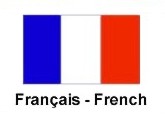MY MEMORIES
During WWII, the whole population of F�ves had been called together by the German mayor. He asked us whether we wanted to stay or
leave the village. As my father had been a soldier in the German army during WWI, he knew what the Germans were worth, so he
preferred to leave.
One day in April 1941, a bus was waiting for us on the central place in Sem�court. We filled the bus. Our luggage couldn't be more
than 35kg. In Metz, we were put in a train towards the south of France. But on the way, the train stopped in Dijon, where we were
sent in a little village surrounded by mountains. We stayed there for 3 weeks. We were put in a holiday camp. There were people from
Sem�court, F�ves and Norroy-le-Veneur. Barely settled, we had to leave again towards the south of France, precisely Lavaur. We would
stay with the inhabitants. We started our new life with almost nothing, just the minimum. My father could find a job in a bakery.
End of 1944, the American soldiers came. What a relief! We already were thinking of our return to our native land, Lorraine.
A few months later, we came to our small village of F�ves. What desolation! Everything had been bombed. Our house had a big hole
just over the door. Everybody could go in as they wished. Everything had been plundered: linen, clothes, tableware, furniture ...
well, you can imagine.
One good day, we heard from our Mayor Mr. Berne, Marc Davoli's grandfather, that a village in the USA was adopting us. They did
fund-raising and sent boxes full of clothes, shoes, canned food, candies, chewing-gum for the kids. In fact, all you needed to start
living normally again. As we were going to school, before we started the class, we received biscuits high in vitamin from our
teacher Mr. Torlotting, G�rard's uncle.
During the break, girls and boys were saying, �Have you seen the beautiful dress, coat, trousers the dear Americans have sent.�
We were very proud.
Having grown up, I married Charles Joly, and 10 children are born. Life went on, but we'll never thank enough that little town in
America that took care of us right after the war. Sometimes I still mention to my children that part of life where many American
people devoted themselves to us, so that we could live decently.
Years passed until a nice morning in 2014 when our Mayor Mr. Ren� Girard sent to us an invitation: �Come join us since we are
hosting a delegation from Morganville. These people or their representatives who did so many good things for us after the war.�
Once again, a big thank you from the bottom of my heart. VIVE L'AMERIQUE.
From my little village of F�ves, I send you big, big kisses and hold you tenderly in my arms.
Your friend who loves you.
Madame Simone Joly
These days will stay forever in my memory, my Friends.
I love you
NOTE: Small hand-drawn heart at the bottom of the page.
NOTE: Version below read at the reception for the American visitors on May 31, 2014.
French:
Expulsion et retour au pays
Quelle ne fut pas ma surprise l'autre jour de voir une photo des habitants de FEVES sur le journal o� toute la jeunesse, du
moins celle qui reste, se retrouver en premi�re page.
En ce qui me concerne, j'ai �t� expuls�e avec mes parents dans le sud de la France � Lavaur. Pendant quatre ans. Puis apr�s la
guerre nous sommes revenus au village.
Notre maison avait �t� touch�e par un obus, juste � la porte d�entr�e. Il y avait un �norme trou. Nous avons �t� relog�s par
ma tante dite �la tante C�cile pour tout le monde�.
Ensuite nous avons re�u des colis qui venaient d'Am�rique, plus pr�cis�ment du Kansas Morganville: habits, nourriture,
friandises, etc...
Nous n'avions plus rien, tout avait �t� vol� ou emport� par les Allemands.
Comme couchette nous avions des lits en bois dit �chalit� et comme matelas des sacs remplis de paille etc...
Il a fallu recommencer � z�ro.
Alors tout le monde a mis un peu d'huile de coude et hop au travail.
En ce temps-l�, toute le monde s�entr'aidait. On �tait content de se retrouver.
C'�tait le bon temps.
Malgr� le malheur.
Mme Joly Simone
English:
Deportation and return Home
What a surprise the other day to see a picture of people from F�ves in the newspaper - all the young people of my youth, or
what was left of them - on the front page.
As far as I was concerned, I was personally deported with my parents to Lavaur in the south of France. We stayed there for four
years.
Then, after the war, we returned to the village. Our house had been damaged by a shell right next to the entrance door. There
was an enormous hole. We had to stay with my aunt, "Aunt Cecile," as everyone called her.
Then we received parcels from the United States, more precisely from Morganville, Kansas: clothing, food, candies, etc... We
had nothing left since everything had been stolen or taken by the Germans.
We had a wooden bed called a "Chalit" [trundle bed] and sacks filled with hay as mattresses. We had to start from scratch. So
everyone started to work together. Everyone helped each other then. We were happy to meet again.
These were the good times, despite our misfortune.
Mme Joly Simone

